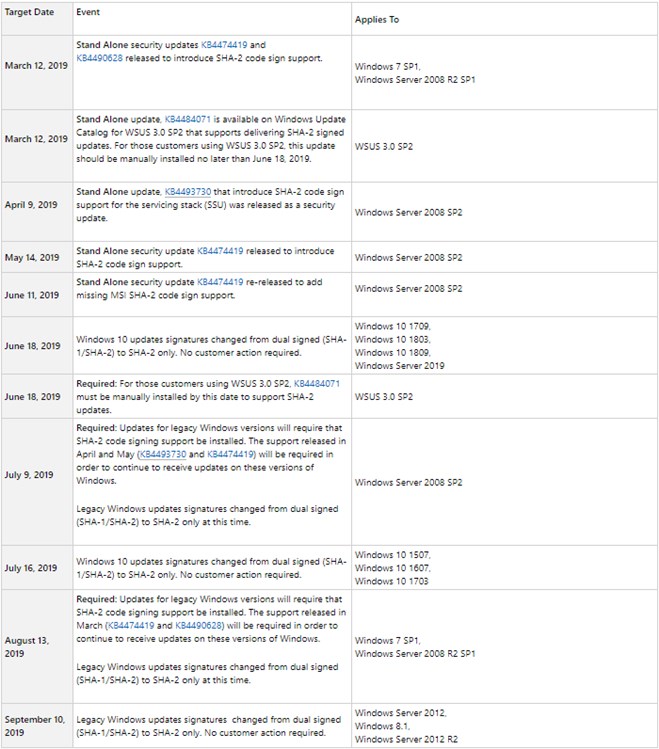2019 SHA-2 Code Signing Support requirement for Windows Update
- Install KB4474419 and KB4490628 for Windows 7 SP1 and Windows Server 2008 R2 SP1.
- Install KB4474419 and KB4493730 for Windows Server 2008 SP2.
2019 SHA-2 Code Signing Support requirement for Windows Update
Posted: 18 Jun 2019
2019 SHA-2 Code Signing Support requirement for Windows and WSUS
Applies to: Windows 7 Service Pack 1, Windows Server 2008 R2 Service Pack 1, Windows Server 2008 Service Pack 2, Windows 10 version 1607, Windows 10 version 1703, Windows 10 version 1709, Windows 10 version 1803, Windows 10 version 1809, Windows 10, Windows Server 2012 Standard, Windows Server 2012 R2, Windows 8.1, Windows Server 2019 all versions, Windows Server Update Services 3.0 Service Pack 2
Summary
To protect your security, Windows operating system updates are dual-signed using both the SHA-1 and SHA-2 hash algorithms to authenticate that updates come directly from Microsoft and were not tampered with during delivery. Due to weaknesses in the SHA-1 algorithm and to align to industry standards Microsoft will only sign Windows updates using the more secure SHA-2 algorithm exclusively.
Customers running legacy OS versions (Windows 7 SP1, Windows Server 2008 R2 SP1 and Windows Server 2008 SP2) will be required to have SHA-2 code signing support installed on their devices by July 2019. Any devices without SHA-2 support will not be offered Windows updates after July 2019. To help prepare you for this change, we will release support for SHA-2 signing in 2019. Windows Server Update Services (WSUS) 3.0 SP2 will receive SHA-2 support to properly deliver SHA-2 signed updates. Refer to the Product Updates section for the migration timeline.
Background details
The Secure Hash Algorithm 1 (SHA-1) was developed as an irreversible hashing function and is widely used as a part of code-signing. Unfortunately, the security of the SHA-1 hash algorithm has become less secure over time due to weaknesses found in the algorithm, increased processor performance, and the advent of cloud computing. Stronger alternatives such as the Secure Hash Algorithm 2 (SHA-2) are now strongly preferred as they do not suffer from the same issues. For more information about of the deprecation of SHA-1, see Hash and Signature Algorithms.
Product updates
Starting in early 2019, the migration process to SHA-2 support will occur in stages, and support will be delivered in standalone updates. Microsoft is targeting the following schedule to offer SHA-2 support. Please note that the timeline below is subject to change. We will update this page as the process begins and as needed.
Frequently Ask Questions
How are the updates for KB3033929 and KB4039648 different from the stand-alone updates shipped in March and April?
The SHA-2 code-signing support was shipped early to ensure that most customers would have the support well in advance of Microsoft’s change to SHA-2 signing for updates to these systems. The stand-alone updates include some additional fixes and are being made available to ensure that all of the SHA-2 updates are in a small number of easily identifiable updates. Microsoft recommends that customers that maintain system images for these OSes to apply these updates to the images.
Will other versions of WSUS add SHA-2 support?
Starting with WSUS 4.0 on Windows Server 2012, WSUS already supports SHA-2-signed updates, and no customer action is needed for these versions.
Only WSUS 3.0 SP2 needs KB4484071 installed to support SHA2 only signed updates.
What should I do if I receive error code 80096010, “Windows Update encountered an unknown error” when attempting to install an update on Windows 7 SP1, Windows Server 2008 R2 SP1, or Windows Server 2008 SP2?
Install the following updates and then attempt to install the update that failed again:
Source: https://support.microsoft.com/en-us/...ndows-and-wsus

